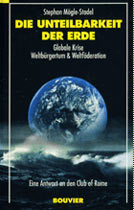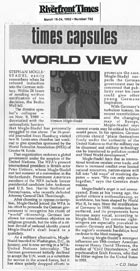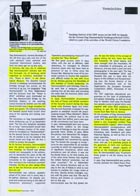| World Federation, a study by Prof. Dr. Ronald J. Glossop | |||||||
|
|
|||||||
|
|||||||
|
|
|||||||
On World Federation by Ronald J. Glossop
Glossup, Ronald J., “On World Federation,” Newsletter of the Concerned Philosophers for Peace, Vol. 26 (Spring - Summer 2006).
At the global level, a democratic world federation would provide a way of using deliberation to deal with global problems such as (1) putting an end to war and the availability of increasingly deadly weapons, (2) regulating the global economy and the behavior of transnational corporations, (3) controlling the worldwide transmission of diseases in both humans and animals, (4) managing those resources and areas which are beyond the jurisdiction of individual nations (e.g. outer space and the oceans), (5) halting the process of global environmental pollution (e.g. destruction of the ozone layer and global warming), (6) protecting universally recognized human rights, (7) dealing with terrorism and international crime, and (8) promoting a sense of global community which would override loyalty to ethnic, national, or religious groups.
One of the objections typically raised against the creation of such a world federation is that it could degenerate into a global tyranny. But such a tyranny could develop even in the absence of a world government. What if Hitler’s scientists had developed the atomic bomb before the Allies were able do it? What if a national dictator acquired some new bacteriological weapon that would kill everyone but a few of his supporters who had been immunized against it? What if a national dictator gained unstoppable power by controlling cloned super-warriors? Furthermore, what is the likelihood of democracy continuing to survive at the national level if the threat of war and terrorism is not checked by instituting the rule of law at the global level?
Above and beyond rebutting these objections, world federalists note that the danger of a tyrant taking over the world is much greater under the present semi-anarchic international system than it would be if a democratic world federation were created.
Thirdly, there are some specific arrangements that could be instituted in a democratic world federation to minimize the danger of its degenerating into a tyranny. Some of these are mentioned in my 1993 book titled World Federation? For example, instead of having a single President or Prime Minister, the executive function of the world government could be performed by a five-person Global Executive Committee (GEC). The world could be divided into eight or nine regions, each with relatively homogeneous cultural characteristics, and it could be agreed that no two members of the GEC could come from the same region. Each year one new member could be elected (probably by the World Parliament) to the GEC for a five-year term, and during their fifth year that member would serve as GEC chair. There could be a two-term limit for serving on the GEC.
Such arrangements should provide assurance that no single individual or nation would come to dominate the whole.
Another way of protecting against an overthrow of a democratic world government would be to have four somewhat autonomous police forces, each of which has personnel stationed all over the world. Each force would have its own officers, training schools, supply services, uniforms, and so on. Leaders would be promoted only from within their own force, and the four forces would be kept separate from each other (except possibly in athletic competition against each other). Volunteers would be assigned to the four forces in such a manner that there would be a similar mixture of nationalities and races in all four separate forces. Besides their professional training, members of these forces could be engaged in educational programs, in fighting international organized crime, in developing personal hobbies, and in providing humanitarian assistance in case of floods and other natural disasters. Even if a small group could manage to take control of one of these forces, there would still be three other forces to hold that one in check.
Obviously, there are other concerns about possible undesirable consequences of creating a democratic world federation, but we also need to keep in mind the probable undesirable consequences of not doing so.
Still another common argument against a democratic world federation is that it is not feasible. No one can deny that there are problems to be addressed, but that is not the same as saying that there are obstacles that cannot be overcome. We need to shift from a predictive mode of thinking (what is going to happen no matter what we do?) to a prescriptive mode of thinking (what should be done, and what am I going to do to help ensure a positive outcome?) There are problems to be addressed, so let’s address them.
We are intelligent beings, and we should be able to act constructively to deal with the global problems confronting us. At present, we face real threats from the unleashing of weapons of mass destruction, to the global spread of dangerous diseases, to irreversible environmental catastrophes, to extreme shortages of necessities such as water and energy. We should not need the threat of an attack from inhabitants of another planet to stimulate us to collective action. We need democratic government for our global community as well as our national communities.
Ronald J. Glossop is Professor Emeritus of Philosophy and Peace Studies at Southern Illinois University at Edwardsville and author of World Federation? (Jefferson NC: McFarland, 1993, Esperanto translation Monda Federacio? by Johano Rapley published by Glossop in Florissant MO in 2001) and Confronting War (Jefferson NC: McFarland, 1983, 4th ed. 2001). Glossop is active in several non-governmental organizations such as “Citizens for Global Solutions” (formerly “World Federalist Association”) and Esperanto organizations at the local, national, and global level.
 |
 |
 |
||||
 |
 |
NGO forum on global governance in Berlin:  |













